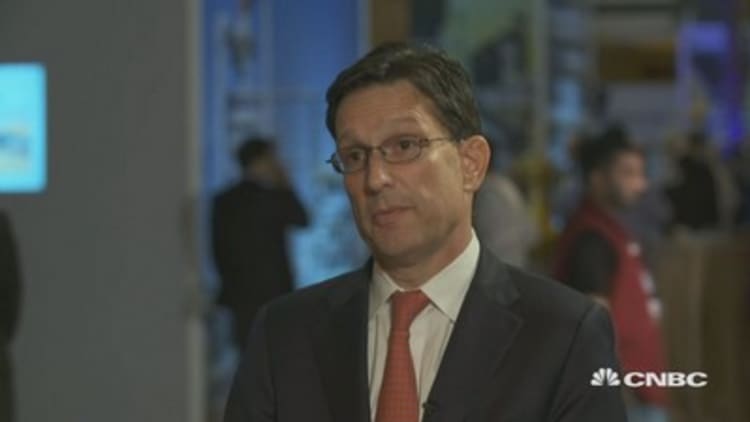Former House majority leader Eric Cantor is among a growing number of Washington insiders encouraging the U.S.'s involvement in a nuclear energy program for Saudi Arabia.
Asked by CNBC's Hadley Gamble on Sunday if it was the right move for the Donald Trump administration to support the Islamic kingdom's nuclear energy pursuits, Cantor replied, "I think there's a lot of commitment and respect mutually in terms of the U.S. and the Saudi Arabian government, and the trust factor is there."
The Virginia Republican, who served 13 years in Congress, has since moved to the private sector where he advises foreign governments on business issues, notably the Saudi government on its anticipated public listing of state-owned oil behemoth Saudi Aramco.
"(Saudi Arabia) is an extremely important and strategic ally of the U.S.," Cantor added. "And for us to want to see that country become a full participant in the global economy and the geopolitical arena is something that I think is in the interest of all Americans and certainly of our government and our strategic interests."

For around five years now, the Saudis have been in informal negotiations with the U.S. and other countries that could sell it nuclear reactors, with the stated aim of diversifying its energy base. In February, the kingdom recruited an American lobbying firm as an advisor on the legal issues surrounding developing a commercial nuclear program.
But what's made many observers nervous is Riyadh's refusal to accept a deal that would forbid it from enriching uranium and reprocessing plutonium — the mechanisms necessary not for nuclear energy, but for developing a weapon.
Saudis find support from Trump
Opposition from U.S. lawmakers on both sides of the political aisle has historically impeded the kingdom's aims — Section 123 of the U.S. Atomic Energy Act of 1954 mandates that Congress review any sharing of nuclear technology with a foreign country.
Now, however, the Saudis have found a friendlier partner in the Trump administration, which has signaled far greater willingness to strike a deal than its predecessors.
A U.S. trade delegation visited the kingdom in April, led by the Washington-based Nuclear Energy Institute (NEI) and in partnership with the U.S. Departments of Commerce, Energy, and State. It brought with it 20 companies from across the U.S. nuclear supply chain, to promote "the strong interest of U.S. industry to partner in Saudi Arabia's ambitious nuclear energy program," according to the delegation's press release.
But the timing of the negotiations is perhaps most controversial — President Trump on Tuesday announced America's withdrawal from the Iran nuclear deal, signed in 2015 with a number of countries to lift economic sanctions on Iran in exchange for restrictions on its nuclear program. The deal was working in its aim to prevent Tehran from developing a bomb, its proponents said — now, they fear the deal's collapse and Iran's return to uranium enrichment.
Tensions with Iran
Months of escalating tensions between Iran and its arch-rival Saudi Arabia raise the stakes for any future nuclear plans. In March, Saudi Crown Prince Mohammed bin Salman told CNBC news that if Tehran was to build a nuclear bomb, so would Riyadh.
U.S. lawmakers and non-proliferation experts have expressed their concern over dual-use technology, and Bin Salman's unpredictable and aggressive foreign policy has not helped his country's case.
But many other nuclear scientists and legislators still are encouraging U.S. support for the kingdom's ambitions: they warn that if Washington walks away, the Saudis will simply pursue alternative suppliers like China or Russia because they feel the program is needed in part to keep pace with Iran.
And that would mean a less secure deal with potentially no conditions, as well as far lower safety and non-proliferation standards than the U.S. would mandate, experts at the NEI have warned.
Saudi Arabia's plans involve building two nuclear reactors by 2020, and sixteen by 2030.
A Nobel prize?
On foreign policy, Cantor praised the commander-in-chief. "I think that if you take away all the noise, all the Twitter, all that, from a domestic and foreign policy standpoint, I think yes he is getting it done," he said.
He pointed to the recent historic rapprochement between North and South Korean leaders Kim Jong Un and Moon Jae-In, which many have attributed to pressure from Trump. The South Korean president went so far as to suggest Trump was deserving of a Nobel Peace Prize for his role in the developments.
Asked if he agreed with that suggestion, Cantor laughed and said, "We'll see." He expressed optimism about the potential for peace between North and South Korea, but stressed that he remained "a little bit skeptical" as to whether North Korea would live up to its commitments, adding that "we've been here before."
Previous negotiations between the longtime adversaries aimed at denuclearization of the Korean peninsula — in 2000 and 2007 — both failed to produce results.


